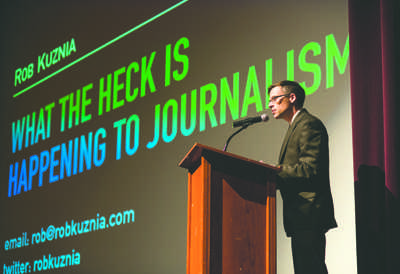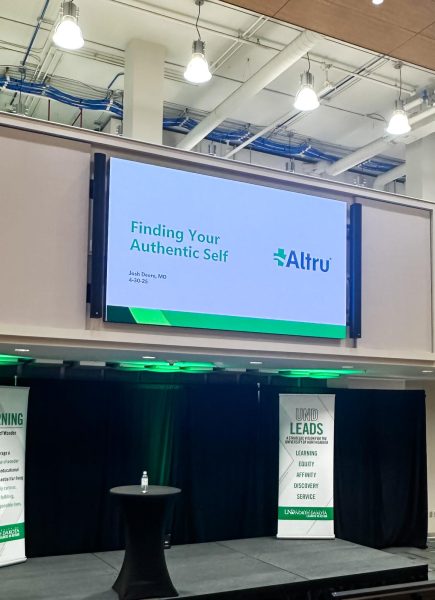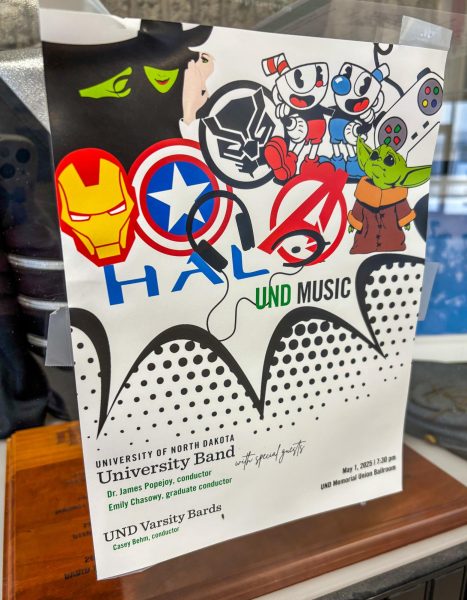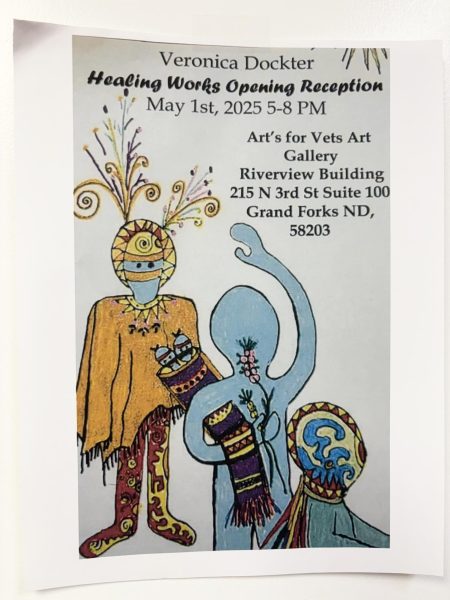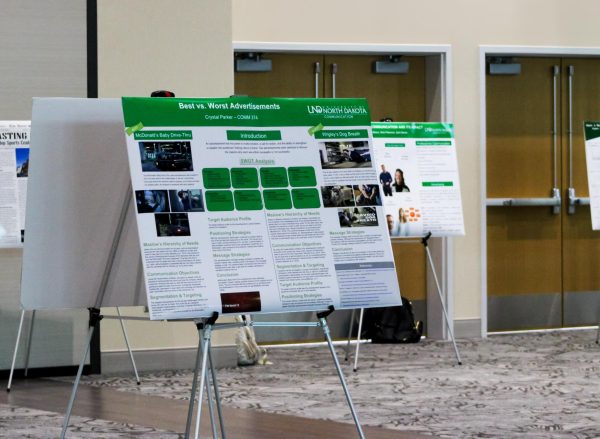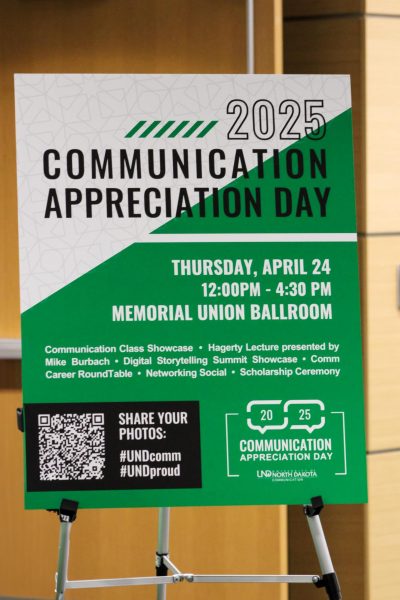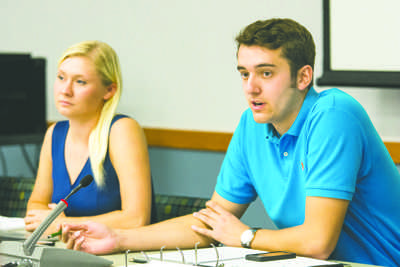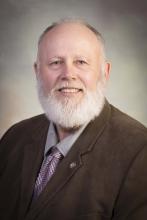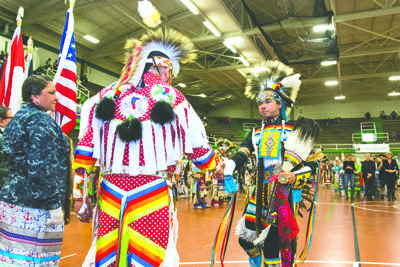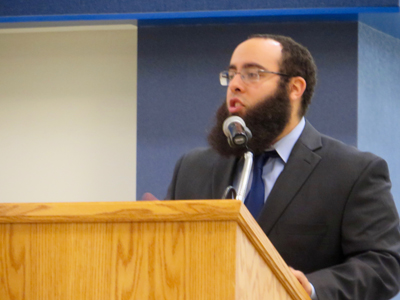Pulitzer winner delivers Hagerty Lecture
Pulitzer Prize winner and Grand Forks native Rob Kuznia speaks at the Empire Arts Center for the 2016 UND Hagerty Lecture Series. Kuznia disussed the state of the journalism industry. Photo by Nick Nelson/The Dakota Student.
More than 20 years ago, Rob Kuznia delivered newspapers for the Grand Forks Herald. Now, he’s delivering lectures as a Pulitzer Prize winner.
Kuznia was selected to speak at this year’s UND Hagerty Lecture, named after long-time Herald editor Jack Hagerty.
The title of the lecture was “What the Heck Is Happening to Journalism?” and was introduced by Mike Jacobs, another former Herald editor, as what he thought “may be the most relevant of the Hagerty Lectures ever.”
It’s no secret that many newspapers around the country are struggling or going under.
Kuznia cited statistics from the American Society of News Editors, stating that “the number of newsroom professionals has plunged 40 percent in less than a decade.”
Kuznia said he didn’t imagine such a drop when he graduated from the University of Minnesota with a degree in journalism. Degree in hand, he drove west with his mother to start his career.
“As the waning hours of the 1900s ticked away, we traveled to Oregon for my new gig, in a sedan packed with my
possessions,” Kuznia told the crowd at the Empire Arts Center.
Kuznia worked for several newspapers, making his way down the Pacific coast before ending up in Torrance, Calif., at the Daily Breeze, a newspaper where he would end his professional journalism career.
Kuznia said the signs of the newspaper industry’s troubles were evident early on.
“Cracks were already beginning to spiderweb their way across the vast face of American journalism,” he said before likening the Daily Breeze’s gutted staff to “the string quartet of the Titanic performing a solemn minuet as the ship angled into the ocean.”
While at the Daily Breeze, Kuznia worked with another reporter and their editor on the story that won them a Pulitzer Prize in 2015. Over six months, they published around 50 stories that exposed corruption that took place after “a confederacy of true profiteers” took advantage of the Centinela Valley School District, a low-income area.
At the center of the scandal were the superintendent, the school board, local politicians and a construction company. Kuznia said they treated the school district like a cash machine while students suffered.
The superintendent, who made up to $700,000 a year, took a $35,000 vacation payout while student programs were
being cut.
The construction company in question financed the campaigns of school board members, who in turn awarded the company with large contracts, Kuznia said.
Meanwhile, test scores in the district ranked last out of the 80 districts in Los Angeles County.
Because of the work of Kuznia and others at the Daily Breeze, the superintendent was fired and replaced, multiple board members were removed and most of the cut programs were restored. The FBI also launched an investigation.
While the story was successful in both outcome and accolade, Kuznia said he felt it signaled the end of an era.
“Prior to the Pulitzer announcement, the Centinela Valley story felt like a fitting swan song — a good note on which to leave the profession that, for me at least as a local reporter, was barely paying the bills,” Kuznia said. “But I left with a heavy heart.”
While Kuznia still works in journalism on a freelance basis, his new career is in public
relations. He works for the USC Showa Foundation, which archives video testimonies from Holocaust survivors. The foundation, which was started by director Steven Spielberg, is home to more than 53,000 videos.
Things have changed in journalism, Kuznia said, but he doesn’t believe all is lost.
Kuznia talked about a digital revolution and how news is now everywhere. Unfortunately, he said, much of it is rehashed by news aggregators. The original content is created by journalists Kuznia referred to as “workhorses,” those who still are getting on the phone and knocking on doors to get a story.
On the other hand, Kuznia said, having a story picked up by a national outlet can give the writer and the story’s subjects better visibility.
No matter how one gets their news, there still are some simple truths to what makes good journalism, according to Kuznia.
“The value of journalism is not about whether the platform is a newspaper or a website or a social app or a TV format,” Kuznia said. “The value of journalism is about finding new stuff. Period.”
How journalism will look in the future is to be determined, Kuznia said, adding that things don’t always change overnight when it comes to how we communicate.
“The printing press took a long time to catch on,” Kuznia said. “The before and after of the printing press is well-documented, but the revolution is not.”
After the lecture, Kuznia answered audience questions, one of which came from UND senior Billy Beaton.
“You used the word revolution there once,” Beaton said. “Do you think that’s what it’s going to take — normal people realizing they can contribute to communicating things in different ways away from the traditional models?”
Kuznia said he believes the newspapers that are successful are those that are willing to experiment, adding that this is
especially true for newspapers that are in danger of shutting down.
Beaton told the Dakota Student after the lecture that he agreed with Kuznia on experimentation, adding that he experiments with form in Sandbagger News, a video news source he’s a part of. Beaton also is a former editor-in-chief of the Dakota Student.
Sandbagger News is built on the idea of everyone contributing as much as they can, not unlike during a flood.
“The concept really is revolutionary because, like Rob said, [newspapers] have very narrow ways of doing things, and now they’re kind of going away whether we like it or not,” Beaton said.
Like Kuznia, Beaton is a Grand Forks native. Beaton said he never imagined staying in Grand Forks after graduation, but the more he gets involved with the community through events such as the Hagerty Lecture, the more likely he is to stay.
“There’s work to be done here,” Beaton said. “And there’s a community here that wants to support us.”
Lucas Amundson is a features editor for The Dakota Student. He can be reached at lucas.amundson@und.edu


